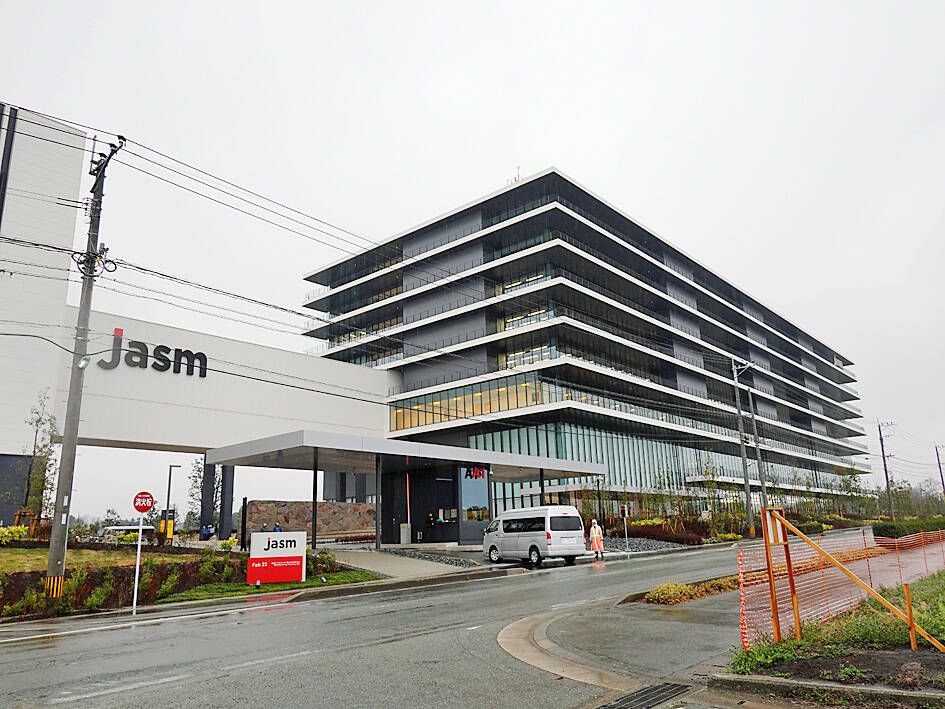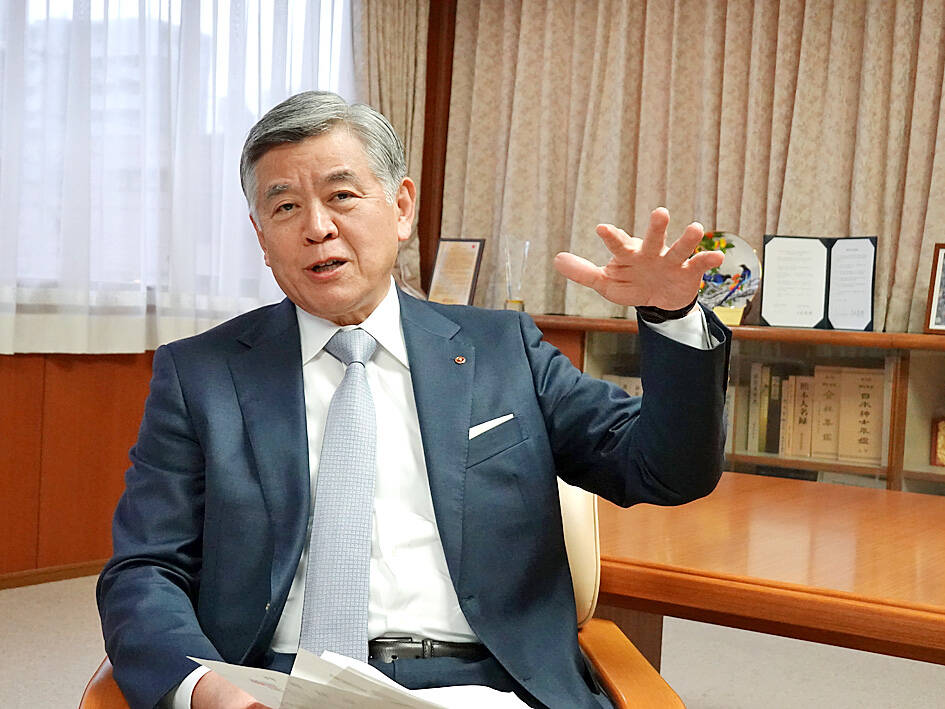The arrival of Taiwan Semiconductor Manufacturing Co (TSMC, 台積電) in Japan’s Kumamoto Prefecture marks the regaining of the area’s pivotal position established during the Meiji Restoration in the 19th century, a local business leader said in an interview with CNA.
The first fab of Japan Advanced Semiconductor Manufacturing Inc (JASM), TSMC’s majority-owned manufacturing subsidiary in Kumamoto, is set to open today.
After the 1868 Meiji Restoration, Kumamoto was of key importance as it was home to a major garrison national defense. However, that position was ceded to Fukuoka after World War II as Japan turned to foreign trade for post-war economic development, and Kumamoto does not have a port, Kumamoto Chamber of Commerce and Industry chairman Akito Kuga said on Thursday.

Photo: CNA
JASM was set up by TSMC and Sony Group Corp in Kumamoto — and with it came a range of industries. As a result, the prefecture has gained renewed attention, Kuga said.
Kyushu, where Kumamoto Prefecture is situated, once had a successful semiconductor industry that led to it being called “silicon island Kyushu,” but it later fell into decline, he said.
With TSMC’s arrival, some have suggested that “silicon island Kyushu” is rising again, but Kuga said a “reborn silicon island Kyushu” would be a more apt description.

Photo: CNA
Japanese conglomerations such as Sony, Mitsubishi Electric Corp, Sumco Corp and Kyocera Corp have all made major semiconductor-related investments in Kyushu following TSMC’s announcement in 2021 that it planned to set up a plant in Kumamoto.
Fujifilm Holdings Corp last month expanded manufacturing facilities in its semiconductor materials factory in Kumamoto’s Kikuyo town, where TSMC’s plant is located, while Ebara Corp, a major industry machinery producer, in June last year announced plans to set up new factories to produce semiconductor-making equipment in Kumamoto.
Rohm Semiconductor, a Japanese company, is investing 289.2 billion yen in a new semiconductor plant in Miyazaki Prefecture, also in Kyushu, to produce silicon carbide power chips popular with electric car makers.
When asked about the estimated economic benefits to be generated by the TSMC Kumamoto plant, Kuga said if two Kumamoto fabs are built, bringing in 3.2 trillion yen of investment, there could be a total of 10.5 trillion yen over 10 years until 2030, citing an estimation done by the Kyushu Economic Research Center in December last year.
However, that number does not include investments made on residences and other infrastructure, he said, estimating that the figure could reach tens of trillions of yen if these are included.
Taiwan is not the only country that is seeing its semiconductor-related companies invest in Japan, as some major US semiconductor companies are also building new plants in Japan, Kuga said.
However, the Japanese business head said that since TSMC’s business model is one of co-manufacturing and co-researching new techniques with different kinds of corporations, it has the best prospect among those investing in Japan.
Kuga also mentioned misgivings about TSMC’s arrival in Kumamoto, a prefecture that is the fifth biggest producer of agricultural products in the country.
The influx of factories will make striking a balance between the needs of farmland for livestock farming and industrial development an ongoing task for the local government, he said.
At the end of the interview, Kuga told CNA that he welcomes Taiwanese people working in Kumamoto, as he believes there are many similarities between Taiwanese and Kumamoto people, such as proactivity, work capabilities, and most importantly, their cheerfulness.
“Pay has also been pushed up [by the semiconductor boom],” he said.

Taiwan Semiconductor Manufacturing Co (TSMC, 台積電) last week recorded an increase in the number of shareholders to the highest in almost eight months, despite its share price falling 3.38 percent from the previous week, Taiwan Stock Exchange data released on Saturday showed. As of Friday, TSMC had 1.88 million shareholders, the most since the week of April 25 and an increase of 31,870 from the previous week, the data showed. The number of shareholders jumped despite a drop of NT$50 (US$1.59), or 3.38 percent, in TSMC’s share price from a week earlier to NT$1,430, as investors took profits from their earlier gains

In a high-security Shenzhen laboratory, Chinese scientists have built what Washington has spent years trying to prevent: a prototype of a machine capable of producing the cutting-edge semiconductor chips that power artificial intelligence (AI), smartphones and weapons central to Western military dominance, Reuters has learned. Completed early this year and undergoing testing, the prototype fills nearly an entire factory floor. It was built by a team of former engineers from Dutch semiconductor giant ASML who reverse-engineered the company’s extreme ultraviolet lithography (EUV) machines, according to two people with knowledge of the project. EUV machines sit at the heart of a technological Cold

TAIWAN VALUE CHAIN: Foxtron is to fully own Luxgen following the transaction and it plans to launch a new electric model, the Foxtron Bria, in Taiwan next year Yulon Motor Co (裕隆汽車) yesterday said that its board of directors approved the disposal of its electric vehicle (EV) unit, Luxgen Motor Co (納智捷汽車), to Foxtron Vehicle Technologies Co (鴻華先進) for NT$787.6 million (US$24.98 million). Foxtron, a half-half joint venture between Yulon affiliate Hua-Chuang Automobile Information Technical Center Co (華創車電) and Hon Hai Precision Industry Co (鴻海精密), expects to wrap up the deal in the first quarter of next year. Foxtron would fully own Luxgen following the transaction, including five car distributing companies, outlets and all employees. The deal is subject to the approval of the Fair Trade Commission, Foxtron said. “Foxtron will be

INFLATION CONSIDERATION: The BOJ governor said that it would ‘keep making appropriate decisions’ and would adjust depending on the economy and prices The Bank of Japan (BOJ) yesterday raised its benchmark interest rate to the highest in 30 years and said more increases are in the pipeline if conditions allow, in a sign of growing conviction that it can attain the stable inflation target it has pursued for more than a decade. Bank of Japan Governor Kazuo Ueda’s policy board increased the rate by 0.2 percentage points to 0.75 percent, in a unanimous decision, the bank said in a statement. The central bank cited the rising likelihood of its economic outlook being realized. The rate change was expected by all 50 economists surveyed by Bloomberg. The